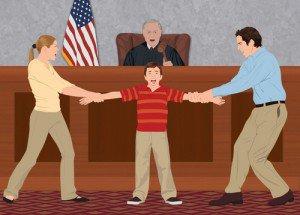Recent Blog Posts
Understanding Temporary Custody Orders
Posted on June 03, 2015 in Child Custody and Support
 For many parents, determining arrangements for their children in divorce can be very difficult. It can be especially challenging during the actual divorce proceedings as they must continue to provide for their children while negotiation or litigation continues. Some couples are able to parent cooperatively throughout the process, despite the lack of a formal agreement. Others, however, may be best served by a temporary custody order which clearly delineates each parent’s responsibilities until a final order can be determined.
For many parents, determining arrangements for their children in divorce can be very difficult. It can be especially challenging during the actual divorce proceedings as they must continue to provide for their children while negotiation or litigation continues. Some couples are able to parent cooperatively throughout the process, despite the lack of a formal agreement. Others, however, may be best served by a temporary custody order which clearly delineates each parent’s responsibilities until a final order can be determined.
Considerations in a Temporary Order
Any parent involved a custody proceeding, including one related to an order modification, can request that a temporary order be issued. Illinois law provides that the court may enter a temporary award of custody based on the same considerations of permanent custody. These include, among others:
Continue Reading ››
Life Insurance and Divorce: Remember to Change Your Beneficiary
Posted on June 01, 2015 in Divorce
 The financial implications of divorce can certainly be far-reaching. In some cases, they may continue to impact a divorced couple even after the death of one ex-spouse. This often occurs in situations involving life insurance policies that were addressed during proceeding related to the division of property.
The financial implications of divorce can certainly be far-reaching. In some cases, they may continue to impact a divorced couple even after the death of one ex-spouse. This often occurs in situations involving life insurance policies that were addressed during proceeding related to the division of property.
As with any asset acquired during the course of marriage, most life insurance policies are considered marital property. They were generally purchased with marital assets and intended for the benefit of the surviving spouse and children. Therefore, during a divorce, the value and future proceeds of a life insurance policy must usually be considered and allocated equitably, according to Illinois law.
Some divorce agreements will require the owner of the policy to keep his or her ex-spouse as the beneficiary. This may be done to provide an alternative source of spousal maintenance or child support, for example, in the event of the payor’s untimely death. An ex-spouse may also remain as a beneficiary of the policy simply to offset the policyholder’s allocation of a different marital asset. For example, in exchange for being allowed to keep a jointly-owned vehicle, the policyholder may agree to keep his ex-wife as the policy’s beneficiary.
Continue Reading ››
Hiring the Right Divorce Attorney: Questions to Ask
Posted on May 29, 2015 in Divorce
 Under the best of circumstances, divorce is a difficult process. There are many considerations to be made and legal concerns to be addressed, all in the midst of a whirlwind of emotion related to the breakdown of a relationship. As you head toward divorce, you have probably been encouraged by friends and family to seek the services of an attorney to help you through the process and you may have even received recommendations on which lawyer to hire.
Under the best of circumstances, divorce is a difficult process. There are many considerations to be made and legal concerns to be addressed, all in the midst of a whirlwind of emotion related to the breakdown of a relationship. As you head toward divorce, you have probably been encouraged by friends and family to seek the services of an attorney to help you through the process and you may have even received recommendations on which lawyer to hire.
The attorney you choose can certainly have a great impact on the outcome of your divorce, as well as your experience during the proceedings. Your decision should be based on your own research and your comfort level with an individual lawyer’s answers to the questions you may have, including:
Continue Reading ››
Right of First Refusal in Illinois
Posted on May 28, 2015 in Child Custody and Support
 After a divorce or other situation leading to the creation of a child custody order, most parents are granted certain amounts of time with their child or children. This time may be rather significant, as would be the case for a parent who was awarded sole custody of a child, or it may be relatively limited, as would be the case for a parent with visitation for a few days each month. For many other parents, their time with the child often falls somewhere in between. Challenges may arise, however, when, for whatever reason, a single or divorced parent needs to find alternative care for the child during his or her arranged parenting time. In such situations, the Illinois law regarding the “right of first refusal” may be invoked.
After a divorce or other situation leading to the creation of a child custody order, most parents are granted certain amounts of time with their child or children. This time may be rather significant, as would be the case for a parent who was awarded sole custody of a child, or it may be relatively limited, as would be the case for a parent with visitation for a few days each month. For many other parents, their time with the child often falls somewhere in between. Challenges may arise, however, when, for whatever reason, a single or divorced parent needs to find alternative care for the child during his or her arranged parenting time. In such situations, the Illinois law regarding the “right of first refusal” may be invoked.
Child Custody and Right of First Refusal
Under the Illinois Marriage and Dissolution of Marriage Act, any child custody arrangement involving joint custody or rights of visitation may also include provisions for the right of first refusal. The terms of first refusal rights may be amicably negotiated by the parties or determined and awarded by the court to one or both parents. As with most child-related issues, the best interest of the child is expected to remain the highest priority in making such a determination.
Continue Reading ››
Child Representatives in Child-Related Court Proceedings
Posted on May 20, 2015 in Child Custody and Support
 Any legal matter related to children can quickly become emotionally charged and fraught with challenges. Parents, especially those going through a bitter divorce or separation, can often have trouble remaining objective and keeping their child’s best interest a priority. In such cases, the court may choose to appoint an independent attorney as a Child Representative to serve the child’s needs without emotional complications.
Any legal matter related to children can quickly become emotionally charged and fraught with challenges. Parents, especially those going through a bitter divorce or separation, can often have trouble remaining objective and keeping their child’s best interest a priority. In such cases, the court may choose to appoint an independent attorney as a Child Representative to serve the child’s needs without emotional complications.
Child Representative Situations
Frequently in child custody, support, and visitation cases, the interested parties are dealing with a number of contentious issues related to the end of a marriage. Unmarried couples, as well, may struggle to remain civil as the end of any relationship can lead to feelings of anger, betrayal, and confusion about the future.
Negotiations regarding a couple’s children may start amicably but too often deteriorate into an ugly situation in which neither parent will compromise. The focus of the case may become clouded while “winning” and “losing” gain more importance than the well-being of the child. A situation like this may necessitate the court to appoint a Child Representative who is tasked with acting on behalf of the child’s best interests.
Continue Reading ››
Could Your Spouse Be Hiding Assets?
Posted on May 18, 2015 in Divorce
 It is an unfortunate reality of modern life that spouses often find it difficult to be completely honest with each other, particularly in matters pertaining to money. For some couples, it may be motivated by fear of embarrassment, as one spouse may not be especially proud of decisions that he or she has made. For others, however, the motivation may be more selfish, as a spouse insists on keeping a portion of his or her assets hidden from the other partner, so as to retain them for his or her own personal benefit.
It is an unfortunate reality of modern life that spouses often find it difficult to be completely honest with each other, particularly in matters pertaining to money. For some couples, it may be motivated by fear of embarrassment, as one spouse may not be especially proud of decisions that he or she has made. For others, however, the motivation may be more selfish, as a spouse insists on keeping a portion of his or her assets hidden from the other partner, so as to retain them for his or her own personal benefit.
Hiding assets during a marriage is seen by many as a form of infidelity, which can have a detrimental impact to the marital relationship. When such actions or intentions are discovered, the trust level between partners may be severely damaged, often leading to divorce. Continuing to hide assets during divorce, however, can be even more serious, as doing so constitutes a violation of the law.
Continue Reading ››
The Role of Mental Health Professionals in Divorce
Posted on May 12, 2015 in Divorce
 Nobody will claim that divorce is easy. Even the most amicable of situations still bring certain challenges and stresses for the divorcing couple. Interestingly, while recommending the help of a legal professional during divorce is a very common and welcome suggestion for many couples, suggesting that a couple seek help from a mental health professional often seems too personal or invasive. Mental health professionals, however, have a great deal of insight to offer a divorcing couple, especially if the divorce is being handled through mediation or collaborative law.
Nobody will claim that divorce is easy. Even the most amicable of situations still bring certain challenges and stresses for the divorcing couple. Interestingly, while recommending the help of a legal professional during divorce is a very common and welcome suggestion for many couples, suggesting that a couple seek help from a mental health professional often seems too personal or invasive. Mental health professionals, however, have a great deal of insight to offer a divorcing couple, especially if the divorce is being handled through mediation or collaborative law.
The help of a mental health professional can be employed in several ways, any of which may positively contribute to the divorce process. The first of these would seem to be the most traditional way, and that is, as an individual counselor or therapist. Either or both spouses and the children may independently seek the help of a therapist to better understand his or her own approach to the divorce. Counselors can aid an individual in coming to terms with his or her motivations, underlying emotional issues, and even identify potential problems before they arise. Likewise, the couple may seek counseling or therapy together, but, if the divorce is already in process, the benefits of such therapy may be limited.
Continue Reading ››
Child Support and Shared Custody
Posted on May 11, 2015 in Child Custody and Support
 When you share custody of your child, it may feel reasonable to assume that neither parent should be required to pay child support. With shared custody, both parents are expected to contribute to the child’s overall well-being by providing food, shelter, clothing, and covering necessary educational costs in a cooperative manner. However, the laws, as they are currently written in the state of Illinois, may still lead judges to require the payment of child support, even in shared custody arrangements.
When you share custody of your child, it may feel reasonable to assume that neither parent should be required to pay child support. With shared custody, both parents are expected to contribute to the child’s overall well-being by providing food, shelter, clothing, and covering necessary educational costs in a cooperative manner. However, the laws, as they are currently written in the state of Illinois, may still lead judges to require the payment of child support, even in shared custody arrangements.
Child Support in Illinois
Illinois law regarding child support is considered by many to be a bit antiquated as it relates to modern parenting situations. The basic principles of the statute indicate that the court is recommended to require that a supporting parent pay child support as a set percentage of his or her net income. While the law provides some discretion to the court for deviation from the recommendation, most such changes are made based on consideration of income, resources, and needs. This means that factors such as parenting time and parental responsibilities may be frequently ignored as they are not statutorily specified considerations for the court.
Continue Reading ››
Older Divorce May Present Unique Challenges
Posted on May 06, 2015 in Divorce
 “Things just aren’t they way they used to be.” Nearly everyone has something similar from a grandparent or older relative. In many families, such maxims are often used in response to a younger generation’s morals, work ethic, or approach to a particular situation. When it comes to divorce, however, today’s young people may be justified in saying the same thing to older generations, as the divorce rate for those over 50 is at its highest point ever. Social trends notwithstanding, older divorce can present considerable issues for the parties involved, in many ways making such a divorce more complicated than that of a younger couple.
“Things just aren’t they way they used to be.” Nearly everyone has something similar from a grandparent or older relative. In many families, such maxims are often used in response to a younger generation’s morals, work ethic, or approach to a particular situation. When it comes to divorce, however, today’s young people may be justified in saying the same thing to older generations, as the divorce rate for those over 50 is at its highest point ever. Social trends notwithstanding, older divorce can present considerable issues for the parties involved, in many ways making such a divorce more complicated than that of a younger couple.
Age, Health, and Life Expectancy
Continue Reading ››
Denial of Paternity: A Difficult Situation
Posted on May 04, 2015 in Divorce
 When a married couple announces the birth of a new baby, it is generally the cause for great celebration. Friends and family excitedly share the news and join with the mother and father in welcoming the new addition to the family. What if the father, however, is not really the father? The law, as one might expect, does not really address how a family is supposed to deal with such a situation, but it does offer some legal guidelines for the parents on how to proceed.
When a married couple announces the birth of a new baby, it is generally the cause for great celebration. Friends and family excitedly share the news and join with the mother and father in welcoming the new addition to the family. What if the father, however, is not really the father? The law, as one might expect, does not really address how a family is supposed to deal with such a situation, but it does offer some legal guidelines for the parents on how to proceed.
Legally Married, Legal Father
Illinois law regarding paternity assumes that a child born or conceived during a marriage is the child of the married couple, establishing legal parental rights for both the mother and the father. In a vast majority of cases, such an assumption is correct and simplifies the legal process. However, situations may arise in which the husband of the marriage is not, in fact, the biological father of the child, such as infidelity or a new relationship by the mother during an extended divorce process.
Continue Reading ››







 For many parents, determining arrangements for their children in divorce can be very difficult. It can be especially challenging during the actual divorce proceedings as they must continue to provide for their children while negotiation or litigation continues. Some couples are able to parent cooperatively throughout the process, despite the lack of a formal agreement. Others, however, may be best served by a temporary
For many parents, determining arrangements for their children in divorce can be very difficult. It can be especially challenging during the actual divorce proceedings as they must continue to provide for their children while negotiation or litigation continues. Some couples are able to parent cooperatively throughout the process, despite the lack of a formal agreement. Others, however, may be best served by a temporary  The financial implications of divorce can certainly be far-reaching. In some cases, they may continue to impact a divorced couple even after the death of one ex-spouse. This often occurs in situations involving life insurance policies that were addressed during proceeding related to the
The financial implications of divorce can certainly be far-reaching. In some cases, they may continue to impact a divorced couple even after the death of one ex-spouse. This often occurs in situations involving life insurance policies that were addressed during proceeding related to the  Under the best of circumstances, divorce is a difficult process. There are many considerations to be made and legal concerns to be addressed, all in the midst of a whirlwind of emotion related to the breakdown of a relationship. As you head toward
Under the best of circumstances, divorce is a difficult process. There are many considerations to be made and legal concerns to be addressed, all in the midst of a whirlwind of emotion related to the breakdown of a relationship. As you head toward  After a divorce or other situation leading to the creation of a
After a divorce or other situation leading to the creation of a  Any
Any  It is an unfortunate reality of modern life that spouses often find it difficult to be completely honest with each other, particularly in matters pertaining to money. For some couples, it may be motivated by fear of embarrassment, as one spouse may not be especially proud of decisions that he or she has made. For others, however, the motivation may be more selfish, as a spouse insists on keeping a portion of his or her
It is an unfortunate reality of modern life that spouses often find it difficult to be completely honest with each other, particularly in matters pertaining to money. For some couples, it may be motivated by fear of embarrassment, as one spouse may not be especially proud of decisions that he or she has made. For others, however, the motivation may be more selfish, as a spouse insists on keeping a portion of his or her  Nobody will claim that divorce is easy. Even the most amicable of situations still bring certain challenges and stresses for the divorcing couple. Interestingly, while recommending the help of a legal professional during divorce is a very common and welcome suggestion for many couples, suggesting that a couple seek help from a mental health professional often seems too personal or invasive. Mental health professionals, however, have a great deal of insight to offer a divorcing couple, especially if the divorce is being handled through
Nobody will claim that divorce is easy. Even the most amicable of situations still bring certain challenges and stresses for the divorcing couple. Interestingly, while recommending the help of a legal professional during divorce is a very common and welcome suggestion for many couples, suggesting that a couple seek help from a mental health professional often seems too personal or invasive. Mental health professionals, however, have a great deal of insight to offer a divorcing couple, especially if the divorce is being handled through  When you share custody of your child, it may feel reasonable to assume that neither parent should be required to pay child support. With shared custody, both parents are expected to contribute to the child’s overall well-being by providing food, shelter, clothing, and covering necessary educational costs in a cooperative manner. However, the laws, as they are currently written in the state of Illinois, may still lead judges to require the payment of
When you share custody of your child, it may feel reasonable to assume that neither parent should be required to pay child support. With shared custody, both parents are expected to contribute to the child’s overall well-being by providing food, shelter, clothing, and covering necessary educational costs in a cooperative manner. However, the laws, as they are currently written in the state of Illinois, may still lead judges to require the payment of  “Things just aren’t they way they used to be.” Nearly everyone has something similar from a grandparent or older relative. In many families, such maxims are often used in response to a younger generation’s morals, work ethic, or approach to a particular situation. When it comes to
“Things just aren’t they way they used to be.” Nearly everyone has something similar from a grandparent or older relative. In many families, such maxims are often used in response to a younger generation’s morals, work ethic, or approach to a particular situation. When it comes to  When a married couple announces the birth of a new baby, it is generally the cause for great celebration. Friends and family excitedly share the news and join with the mother and father in welcoming the new addition to the family. What if the father, however, is
When a married couple announces the birth of a new baby, it is generally the cause for great celebration. Friends and family excitedly share the news and join with the mother and father in welcoming the new addition to the family. What if the father, however, is 